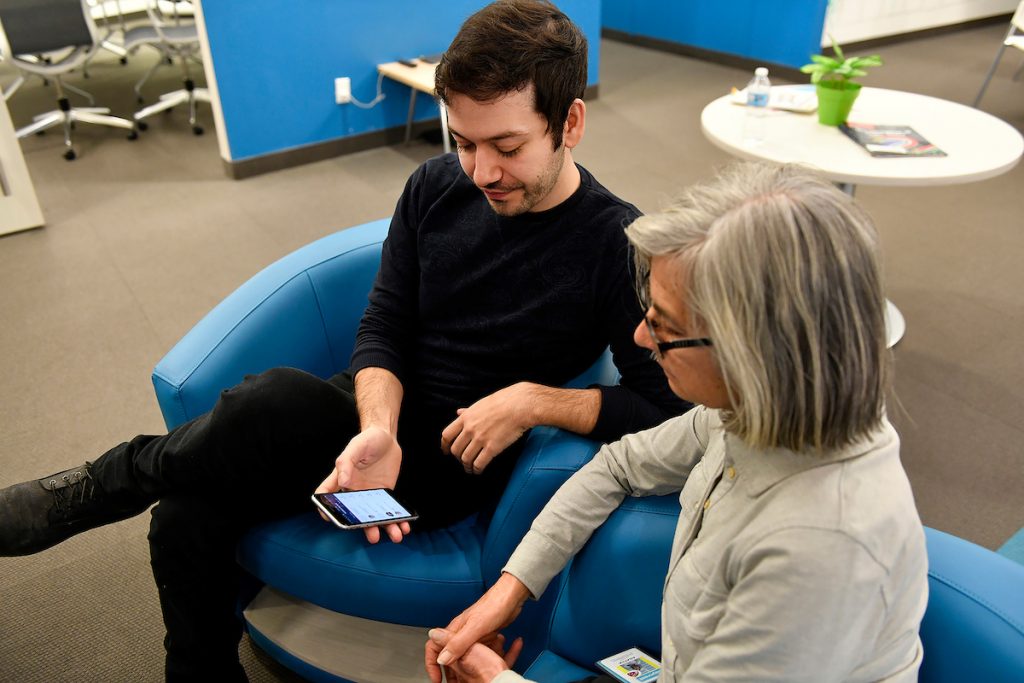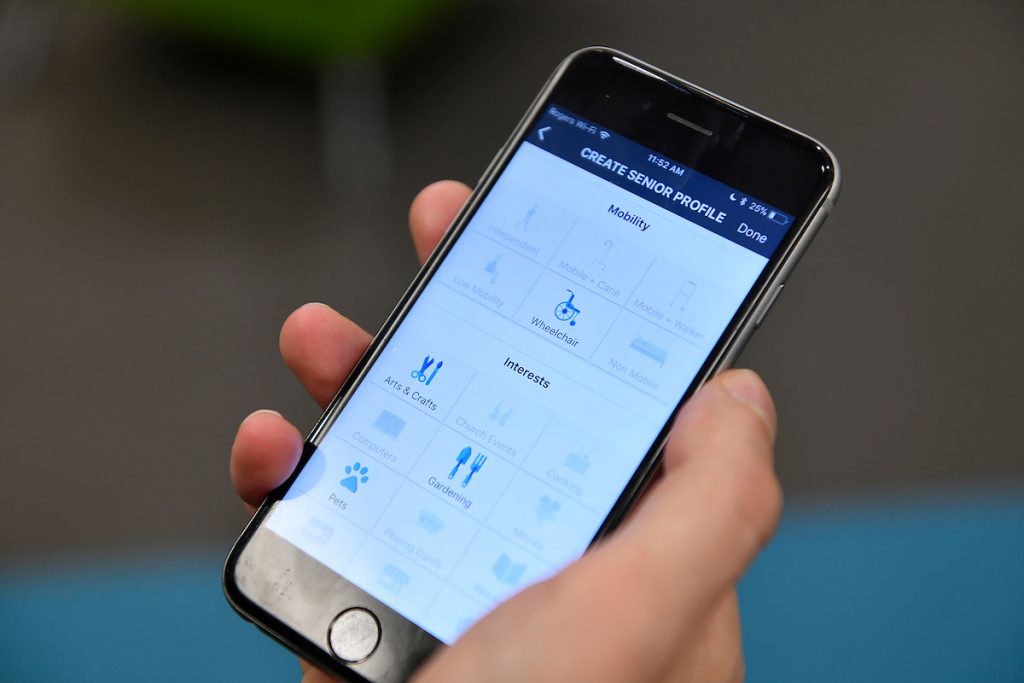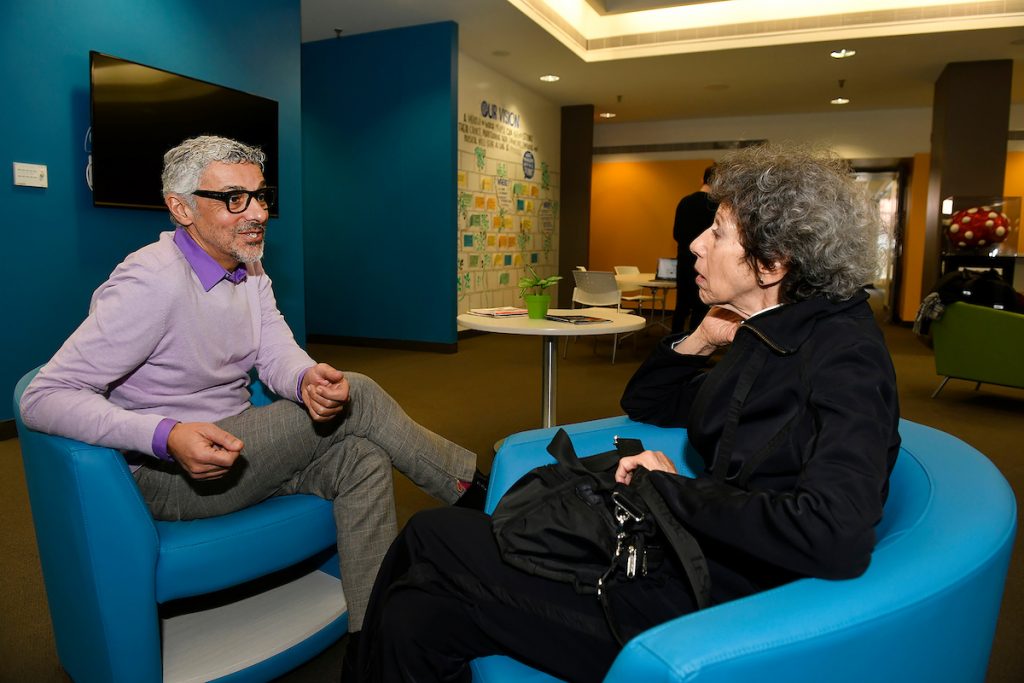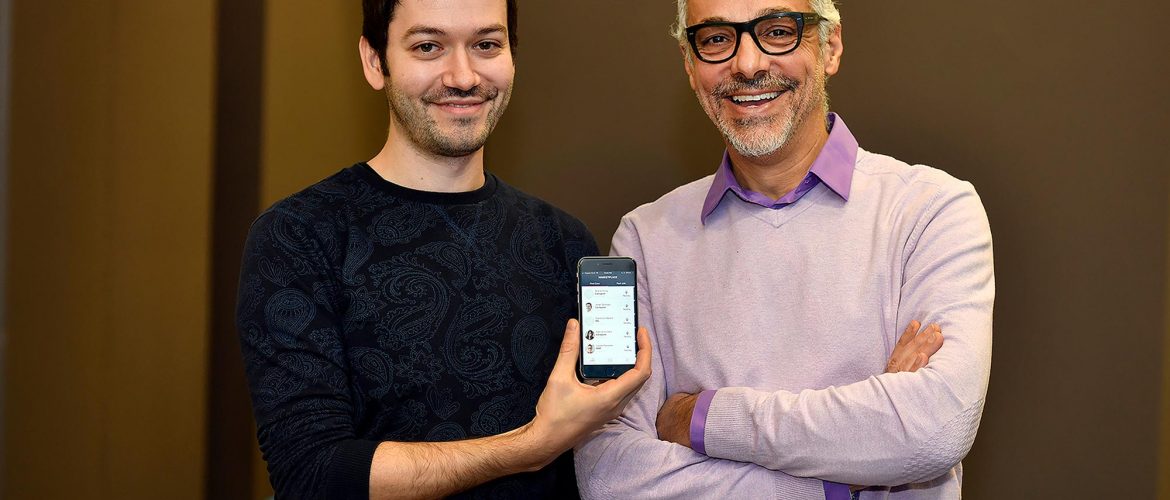Like many innovations, uCarenet’s solution was born out of a personal problem. Ontario-raised entrepreneur NectariCharitakis was working abroad, but found himself constantly returning home to address issues related to his aging parents’ care. These were everyday problems such as finding healthcare workers that were a fit for his parents in their home and that didn’t charge a hefty fee. After his mother and father were robbed twice by care providers, he realized something had to change.
That?s how uCarenet, which Nectari compares to an online marketplace, was born. “Everything we’re trying to do here is keep people in their home, keep them out of publically funded long-term care facilities and keep them out of unneeded emergency room visits. We’re looking to replace antiquated, manual processes to facilitate both collaboration and communication between healthcare providers and families. And help everyone enter into the 21st Century.”

Stephen from uCarenet explains the app to an older adult.
A hybrid solution
uCarenet’s vision for the 21st Century isn’t technology dominated, but rather a hybrid between modern tech and the human connection. “Everybody’s trying to solve this problem only with technology. But you can’t give an 80-year-old person a robot and say, ‘This robot is going to help you get dressed.’ So for me, the vision of the 21st century society is to be able to bridge loving, nurturing, caring people ? the human touch ? with technology. And you can combine the two of them to provide 24/7 care at home.”
uCarenet allows seniors and care providers to create an online profile. Based on the senior’s criteria (for example, language, interests, etc.) they can be matched online with providers that fit their needs. “We’re a small enterprise with a huge social and commercial potential. Our match platform is really a social enterprise ? we don?t look to make any money on that.”
However, users can pay a monthly subscription to access the uCarenet app, which offers tools for both seniors/families and their care providers. For example, families have access to a ‘wellness metre’ to asses, montor and coordinate the quality of care. Meanwhile, care providers can use a Small Business Toolkit that includes marketing tips, financial management and other assistance.
According to Nectari, some agencies will only allow use of their app if the client and provider are engaged in services through them. “You’re forcing people into one little solution, to keep them enclosed like a walled garden. I don’t want that. We want an open garden where everybody can come and do business amongst themselves.”
By cutting out the middle man, Nectari says uCarenet is saving families thousands of dollars every year while simultaneously giving a traditional low-wage job sector the opportunity to bill direct and earn more. Clients and providers can decide whether they want to use the uCarenet app simply as a management tool or in combination with the matching system.

A close-up of uCarenet’s app featuring a profile page.
Nectari says this idea of “democratizing healthcare” by giving both care providers and clients tools and choice ? and doing so in a safe, transparent space ? is why organizations such as the Ontario Personal Support Worker Association are interested in the service. The association believes in the positive impact uCarenet can have for its Ontario-based PSWs and the seniors they collaborate with.
“uCarenet brings personal support workers and their clients together in a safe environment,” says Kathleen Scott, vice president of the Ontario Personal Support Worker Association. “The Ontario Personal Support Workers Association is proud to help uCarenet supply fully vetted Personal Support Workers to Ontario’s most vulnerable.”
CABHI’s role
uCarenet didn’t happen overnight ? “It’s been in the works for more than two years. As with any new product or service, there are no shortage of challenges associated with launching an online community like this.”
“You have technical challenges, you have marketing challenges, you have human resource challenges, you have a lot of these challenges. But those things, if you’re an effective business leader and you have operational skills, you can overcome. The biggest challenge is really getting access to working capital so that we could run trials.”
This is where the Centre for Aging + Brain Health Innovation, led by Baycrest Health Sciences, comes into the picture. uCarenet received financial support through CABHI’s Industry Innovation Partnership program (I2P2), which helps accelerate the evaluation and adoption of products and services that address the needs of aging adults.

Nectari?Charitakis interacts with a senior in the CABHI space.
As Nectari mentioned, a key issue entrepreneurs face is finding trial sites. “One of the biggest challenges in order to bring a solution to market ? especially around digital health ? is everyone wants to see some sort of validation,” he adds.
Through I2P2, CABHI is helping connect uCarenet to two new trial sites across Ontario. The collaboration has also helped support a pre-existing trial partner, Brampton?s William Osler.
“If we didn?t get this financial support, it would be impossible for us to pay the hospitals for their staff to help us run these trials,” shares Nectari, adding that his experience working with the CABHI team has been “extremely positive.”
These trials are crucial in helping uCarenet move forward by providing user feedback and validating his self-directed service model. It?s just one example of how CABHI is helping to foster a culture of innovation within Ontario and Canada as a whole.
Nectari can be reached at: nectar@ucarenet.com


